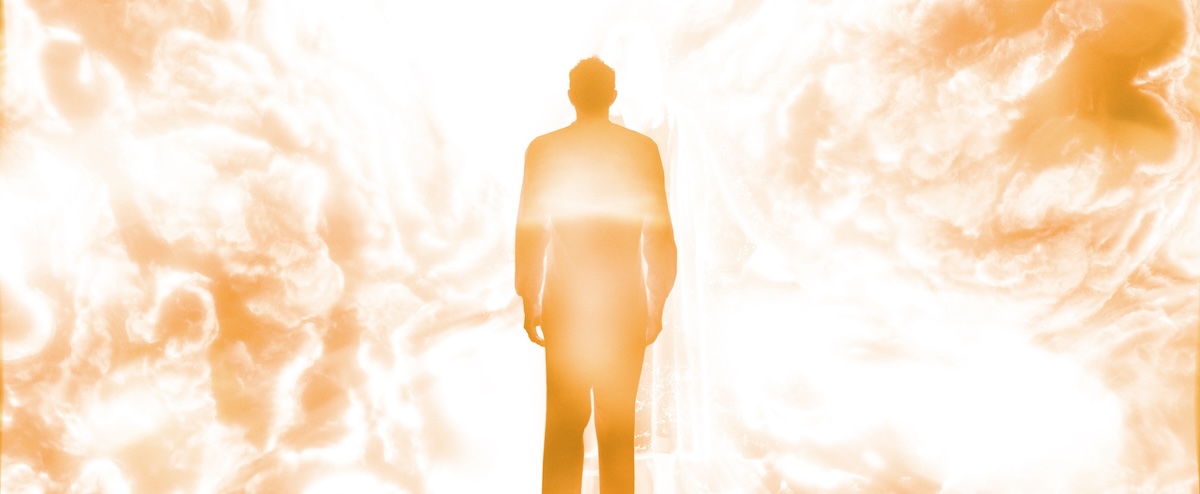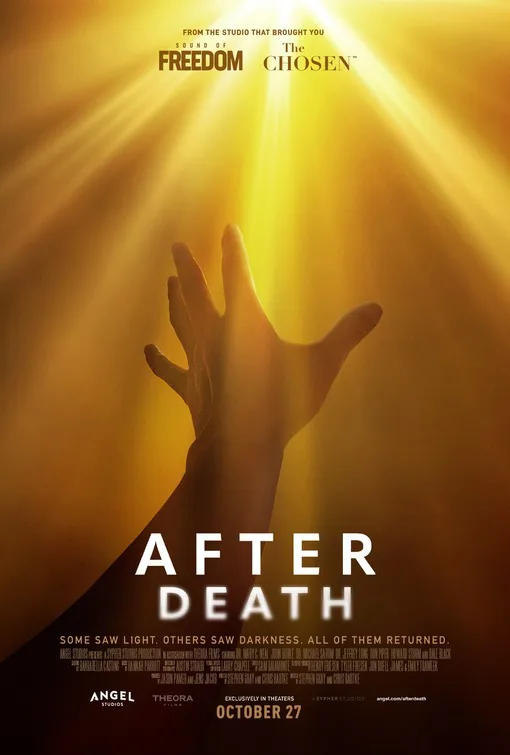In a different life, "After Death" would be street trash. Its presentation would be as a small white pamphlet, printed in earnest and packed with bizarre stories overflowing from someone's desire to share their faith, only for this paper to become more pollution. But in our reality, which some of this project's subjects deem not as real as an afterlife they claim to have seen, it is instead a feature, and, putting it generously, a documentary. This weekend, "After Death" will be playing in over 2,200 theaters, which means that it cannot be ignored. It also cannot be believed, as it barely works as an infomercial.
"After Death" is trying to sell you one thing most of all: itself. It's the latest from Angel Studios, a successful indie movie distribution group that previously won summer headlines by distributing "Sound of Freedom." They made box office history with the Pay It Forward campaign, which asked people to donate money for other people to see it, which nonetheless raised the movie's box office total. Because that worked so well, "After Death" makes the same pitch in its end credits, with co-director Stephen Gray stating the same words (though edited differently), also with a QR code next to his face as with Caviezel.
America has long had its wildest forms of fantasy and comfort fueled by promises about things that are not of this world. Stuff we can't confirm until we die. An afterlife, the pearly gates. "After Death" follows this tradition, with a cadre of talking heads who had incredibly traumatic physical instances that are bundled here as Near-Death Experiences that prove the existence of God and Heaven. Many of them also have written a bestselling book about death, as these credits remind us. A few of them have medical backgrounds. They talk about how there are no Earthly words to express what they experience, and the power of this documentary—or so it intends—is that it can use cinematic tools like swooping drone shots and "Oppenheimer"-like balls of fire to actualize the intangible.
The stories they tell are not entirely unmoving. Initially. They are examples of unimaginable trauma, of immense pain that can define a person. One man crashed a plane. Another was declared dead from extreme stomach problems. Another person talks about a suicide attempt that led him to seeing God as a ball of light. All of these people returned from these experiences with memories of being out of their body, or being in a type of realm more colorful, vibrant, and louder than the regular world. In accounts that we only hear about, even the blind have been able to see when presented in some afterlife-like scenario. While many of the people appear to be well-familiar with sharing their stories the project does not humanize them beyond their purpose to its message. They're just always sitting, adding to the wonky project's grave self-seriousness, with light shining on one side of their face.
These stories are told by co-directors Gray and Chris Radtke with the emotional tact of summer blockbuster trailers: swelling strings, fast cuts, and special-effects heavy reenactments that hog most of the budget. The accounts are sometimes clunkily assembled so that we learn a little about one story, only to then hear another, and then we hear another. Intercut interviews tell us how intense their respective pain was or how finalizing it should have been. Their experience becomes our sloppy spectacle.
Midway through, the superficial "After Death" thinks you have been sold on these transcendental experiences (and maybe you have). From there, it's more about creating awe as it lets one man rip with his experience of near death, including how it made him want to be a better father and son. "After Death" is all about the spectacle and the emotion it can create from such an experience, and it then curdles with a creepiness when it lets people talk for longer. Don Piper, who previously told his story in a book, "90 Minutes in Heaven," and its 2015 feature adaptation, says some things that illuminate a concerning way of this thinking and its reckless promotion here: "Nothing compares to Heaven. That is the most real thing. That is my reality." And then he points to the floor and says, "This is not."
A bad-faith project like this needs to acknowledge skepticism, the gravity that can bring such lofty ideas down to the real world (this one). "After Death" does this only slightly, with words from one of its many medical professionals/bestselling authors. Its overall approach to skepticism is more to flip its logical point. Why are you skeptical that these stories aren't proof? One side is arguing on behalf of physical proof; the other is arguing to believe in lights and choirs that can't actually be seen or heard. (Another doozy for critical thinking: when someone else talking about the same subject matter says, "I have no evidence to suggest it, except that I have no evidence to refute it either.")
Piper later does say one thing that makes sense at the very end. "The death rate is 100%." As in, everybody dies. Well, true. You can't argue with that. And through Angel Studios' website, you can currently buy a $45 sweatshirt boasting this statistic.
Now playing in theaters.




















